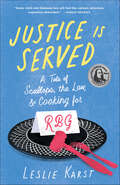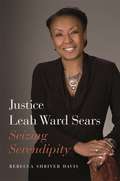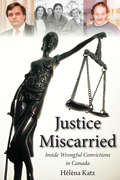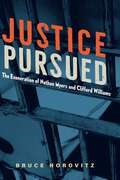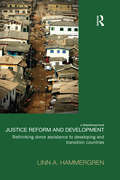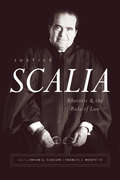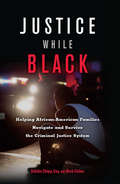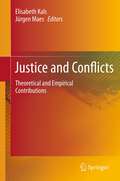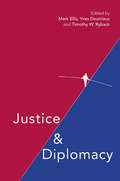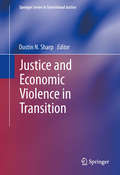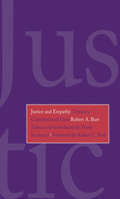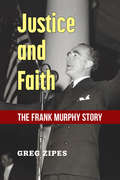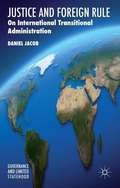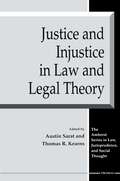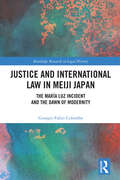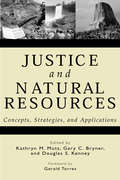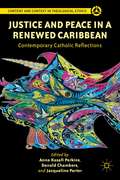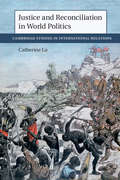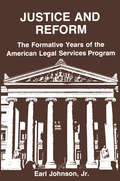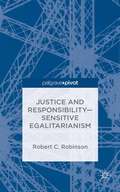- Table View
- List View
Justice Is Served: A Tale of Scallops, the Law, and Cooking for RBG
by Leslie Karst“The book is a romp from cover to cover—and, just like a great meal, left me ready for more.”—Karen Shimizu, Executive Editor, Food & Wine When Leslie Karst learned that her offer to cook dinner for Supreme Court Justice Ruth Bader Ginsburg and her renowned tax law professor husband, Marty, had been accepted, she was thrilled—and terrified. A small-town lawyer who hated her job and had taken up cooking as a way to add a bit of spice to the daily grind of pumping out billable hours, Karst had never before thrown such a high-stakes dinner party. Could she really pull this off? Justice Is Served is Karst’s light-hearted, earnest account of the journey this unexpected challenge launched her on—starting with a trip to Paris for culinary inspiration, and ending with the dinner itself. Along the way, she imparts details of Ginsburg’s transformation from a young Jewish girl from Flatbush, Brooklyn, to one of the most celebrated Supreme Court justices in our nation’s history, and shares recipes for the mouthwatering dishes she came up with as she prepared for the big night. But this memoir isn’t simply a tale of prepping for and cooking dinner for the famous RBG; it’s also about how this event, and all the planning and preparation that went into it, created a new sort of connection between Karst, her partner, and her parents, and also inspired Karst to make life changes that would reverberate far beyond one dinner party. A heartfelt story of simultaneously searching for delicious recipes and purpose in life, Justice Is Served is an inspiring reminder that it’s never too late to discover—and follow—your deepest passion.
Justice Leah Ward Sears: Seizing Serendipity
by Rebecca DavisThis is the first full biography of Justice Leah Ward Sears. In 1992 Sears became the first woman and youngest justice to sit on the Supreme Court of Georgia. In 2005 she became the first African American woman to serve as chief justice of any state supreme court in the country. This book explores her childhood in a career military family; her education; her early work as an attorney; her rise through Georgia's city, county, and state court systems; and her various pursuits after leaving the supreme court in 2009, when she transitioned into a life that was no less active or public. <p><p> As the biography recounts Sears's life and career, it is filled with instances of how Sears made her own luck by demonstrating a sharpness of mind and sagacious insight, a capacity for grueling hard work, and a relentless drive to succeed. Sears also maintained a strict devotion to judicial independence and the rule of law, which led to decisions that would surprise conservatives and liberals alike, earned the friendship of figures as diverse as Ambassador Andrew Young and Justice Clarence Thomas, and solidified a reputation that would land her on the short list of replacements for two retiring U.S. Supreme Court justices. <p> As a woman, an African American, a lawyer, and a judge, Sears has known successes as well as setbacks. Justice Leah Ward Sears shows that despite political targeting, the death of her beloved father, a painful divorce, and a brother's suicide, she has persevered and prevailed.
Justice Miscarried
by Helena KatzFormer bank manager Ronald Dalton never got to watch his three young children grow up. In 1989 he was convicted for a crime that never happened. His wife, Brenda, was later ruled to have choked to death on breakfast cereal not strangled as a pathologist had initially claimed. Dalton’s daughter, Alison, was in kindergarten when he was charged with second-degree murder in 1988. He attended her high school graduation on June 26, 2000, two days after his conviction was finally overturned. <p><p> Behind the proud facade of Canada’s criminal justice system lie the shattered lives of the people unjustly caught within its web. Justice Miscarried tells the heartwrenching stories of twelve innocent Canadians, including David Milgaard, Donald Marshall, Guy Paul Morin, Clayton Johnson, William Mullins-Johnson, and Thomas Sophonow, who were wrongly convicted and the errors in the nations justice system that changed their lives forever.
Justice Outsourced: The Therapeutic Jurisprudence Implications of Judicial Decision-Making by Nonjudicial Officers
by Kelly Frailing Michael L. PerlinNonjudicial officers (NJOs) permeate the criminal justice and the forensic mental health systems in hidden ways. But what are the impact and consequences of non-lawyers and non- “real judges” hearing cases? Across the nation, numerous cases are outsourced to administrative and other NJOs to decide issues ranging from family court cases involving custody disputes and foster care, to alcohol, substance abuse, as well as mental health and institutionalization issues. Moreover, NJOs may also deal with probation sentencing, conditions of confinement, release restrictions, and even capital punishment. The editors and contributors to the indispensable Justice Outsourced examine the hidden role of these non-judicial officers in the courtroom and administrative settings, as well as the ethical and practical considerations of using NJOs. Written from the perspective of therapeutic jurisprudence by judges, criminologists, lawyers, law professors, psychologists, and sociologists, this volume provides a much-needed wake-up call that emphasizes why the removal of a judge weakens a defendant’s rights and dignity and corrupts the administration of justice. However, Justice Outsourced also suggests effective employments of NJOs, revealing the potential of therapeutic principles and procedures to enhance the practical knowledge supplied by nonjudicial decision-makers.
Justice Outsourced: The Therapeutic Jurisprudence Implications of Judicial Decision-Making by Nonjudicial Officers
by Michael L. Perlin and Kelly FrailingNonjudicial officers (NJOs) permeate the criminal justice and the forensic mental health systems in hidden ways. But what are the impact and consequences of non-lawyers and non- “real judges” hearing cases? Across the nation, numerous cases are outsourced to administrative and other NJOs to decide issues ranging from family court cases involving custody disputes and foster care, to alcohol, substance abuse, as well as mental health and institutionalization issues. Moreover, NJOs may also deal with probation sentencing, conditions of confinement, release restrictions, and even capital punishment. The editors and contributors to the indispensable Justice Outsourced examine the hidden role of these non-judicial officers in the courtroom and administrative settings, as well as the ethical and practical considerations of using NJOs. Written from the perspective of therapeutic jurisprudence by judges, criminologists, lawyers, law professors, psychologists, and sociologists, this volume provides a much-needed wake-up call that emphasizes why the removal of a judge weakens a defendant’s rights and dignity and corrupts the administration of justice. However, Justice Outsourced also suggests effective employments of NJOs, revealing the potential of therapeutic principles and procedures to enhance the practical knowledge supplied by nonjudicial decision-makers.
Justice Pursued: The Exoneration of Nathan Myers and Clifford Williams
by Bruce HorovitzAn in-depth look at the reversal of a wrongful conviction in a noteworthy example of the justice system seeking to correct mistakes of the past In 2019, Nathan Myers and Clifford Williams were released after almost 43 years in prison when murder charges against them were dismissed in the first exoneration brought about through a Conviction Integrity Review unit in Florida. Justice Pursued is the story of this wrongful conviction and its landmark reversal, which made headlines as it was initiated by the same state office that sought the death penalty for both men in 1976.Journalist Bruce Horovitz describes in detail the events of the murder of Jeanette Williams and the one-sided trial, conviction, and life sentencing of Nathan Myers and Clifford Williams, drawing on first-person interviews as well as case documents, newspaper clippings, and other media coverage. Horovitz tells how the two men maintained their innocence for years and petitioned the state to reconsider the case. He highlights the creation of Florida’s first Conviction Integrity Review unit, which reinvestigated the evidence and helped overturn the original verdict. He also looks at the issue of compensating exonerees like Myers and Williams for time imprisoned for crimes they did not commit.Incorporating the perspectives of those involved in the initial case and its reexamination four decades later, this tragic story is also one of hope, perseverance, and vindication. Justice Pursued brings awareness to systemic failures in the criminal justice system, the toll these mistakes exact on victims, and the necessity of prosecutorial review in addressing the growing crisis of wrongful convictions in the United States.
Justice Reform and Development: Rethinking Donor Assistance to Developing and Transitional Countries (Law, Development and Globalization)
by Linn A. HammergrenThis book explores the objectives pursued in donor programs, the methods used to advance them, and the underlying assumptions and strategies. It emphasizes the unexpected and sometimes unpleasant consequences of ignoring not only political and societal constraints but also advances in our technical approaches to performance improvement, the one area where the First World has a comparative advantage. The geographic scope of the work is broad, incorporating examples from Eastern and Central Europe, Latin America, Africa, and the Asia-Pacific region as well as from several First World nations. Justice Reform and Development examines First World assistance to justice or "rule of law" reforms in developing and transitional societies, arguing that its purported failure is vastly exaggerated, largely because of unrealistic expectations as to what could be accomplished. Change nonetheless is needed if the programs are to continue and would be best based on targeting specific performance problems, incorporation of donor countries’ experience with their own reforms, and greater attention to relevant research. While contributing to an on-going debate among practitioners and academics involved in justice programs, this book will also be accessible to readers with little exposure to the topics, especially advanced undergraduate and graduate students in law, political science and areas studies.
Justice Scalia: Rhetoric and the Rule of Law
by Brian G. Slocum Francis J. Mootz IIIJustice Antonin Scalia (1936–2016) was the single most important figure in the emergence of the “new originalist” interpretation of the US Constitution, which sought to anchor the court’s interpretation of the Constitution to the ordinary meaning of the words at the time of drafting. For Scalia, the meaning of constitutional provisions and statutes was rigidly fixed by their original meanings with little concern for extratextual considerations. While some lauded his uncompromising principles, others argued that such a rigid view of the Constitution both denies and attempts to limit the discretion of judges in ways that damage and distort our system of law. In this edited collection, leading scholars from law, political science, philosophy, rhetoric, and linguistics look at the ways Scalia framed and stated his arguments. Focusing on rhetorical strategies rather than the logic or validity of Scalia’s legal arguments, the contributors collectively reveal that Scalia enacted his rigidly conservative vision of the law through his rhetorical framing.
Justice While Black: Helping African-American Families Navigate and Survive the Criminal Justice System
by Nick Chiles Robbin ShippAn essential guide for Black Americans to understanding the criminal justice system, and why it continues to see Black men as targets and as dollar signs.Justice While Black is a must-read for every young Black male in America—and for everyone else who cares about their survival and well-being. The book provides practical, straightforward advice on how to deal with specific legal situations: the threat of arrest, being arrested, being in custody, preparing for and undergoing a trial, and navigating the appeals and parole process. The primary goal of this book is to become a primer for African Americans on how to avoid becoming ensnared in the criminal justice system.While the precarious safety of Black males has received renewed interest in the past year because of the deaths of young men like Daunte Wright and Ryan LeRoux, the fact is that this group has always been under threat from the armed guardians of the White social order. The tactics have been modernized, but the impact is still devastating—we are witnessing an epic criminalization of the African-American community at levels never before seen since the end of slavery.
Justice across Boundaries: Whose Obligations?
by Onora O’NeillWho ought to do what, and for whom, if global justice is to progress? In this collection of essays on justice beyond borders, Onora O'Neill criticises theoretical approaches that concentrate on rights, yet ignore both the obligations that must be met to realise those rights, and the capacities needed by those who shoulder these obligations. She notes that states are profoundly anti-cosmopolitan institutions, and that even those committed to justice and universal rights often lack the competence and the will to secure them, let alone to secure them beyond their borders. She argues for a wider conception of global justice, in which obligations may be held either by states or by competent non-state actors, and in which borders themselves must meet standards of justice. This rich and wide-ranging collection will appeal to a broad array of academic researchers and advanced students of political philosophy, political theory, international relations and philosophy of law. Offers an answer to the question of who ought to do what if global justice is to progress, proposing an adequate framework for practical and political claims about global justice. Challenges the claim that global justice must be delivered solely by bounded states. Argues that global justice requires an approach that crosses state boundaries, and discusses the conditions needed both for action and for justifications of action to reach across borders.
Justice among Nations
by Stephen C. Neff"Justice among Nations" tells the story of the rise of international law and how it has been formulated, debated, contested, and put into practice from ancient times to the present. Stephen Neff avoids technical jargon as he surveys doctrines from natural law to feminism, and practices from the Warring States of China to the international criminal courts of today. Ancient China produced the first rudimentary set of doctrines. But the cornerstone of later international law was laid by the Romans, in the form of natural law--a universal law that was superior to early laws and governments. As medieval European states came into contact with non-Christian peoples, from East Asia to the New World, practical solutions had to be devised to the many legal quandaries that arose. In the wake of these experiences, international legal doctrine began to assume its modern form in the seventeenth and eighteenth centuries. New challenges in the nineteenth century encompassed the advance of nationalism, the rise of free trade and European imperialism, the formation of international organizations, and the arbitration of disputes. Innovative doctrines included liberalism, the nationality school, and solidarism. The twentieth century witnessed the formation of the League of Nations and a World Court, but also the rise of socialist and fascist states and the advent of the Cold War. Yet the collapse of the Soviet Union brought little respite. As Neff makes clear, further threats to the rule of law today come from environmental pressures, genocide, and terrorism.
Justice and Conflicts
by Elisabeth Kals Jürgen MaesCentral to the book are questions concerning the existence and the characteristics of justice motives, and concerning the influence that justice motives and justice judgements have on the emergence, but also the solution of social conflicts. Five main themes will be addressed: (1) "Introduction and justice motive", (2) "organizational justice", (3) "ecological justice", (4) "social conflicts", and (5) "solution of conflicts". The authors of the editions are scholars of psychology, as well as distinguished experts from various other disciplines, including sociologists, economists, legal scholar, educationalists, and ethicists. The common ground of all contributors is their independent conduction of empirical research on justice issues. Apart from the German contributors, authors represent scholars from the US, India, Korea, New Zealand, and various European countries (Austria, Switzerland, the Netherlands, UK, Sweden).
Justice and Diplomacy: Resolving Contradictions in Diplomatic Practice and International Humanitarian Law
by Timothy W. Ryback Mark S. Ellis Yves DoutriauxDiplomacy is used primarily to advance the interests of a state beyond its borders, within a set of global norms intended to assure a degree of international harmony. As a result of internal and international armed conflicts, the need to negotiate peace through an emerging system of international humanitarian and criminal law has required nations to use diplomacy to negotiate 'peace versus justice' trade-offs. Justice and Diplomacy is the product of a research project sponsored by the Academie Diplomatique Internationale and the International Bar Association, and focuses on specific moments of collision or contradiction in diplomatic and judicial processes during the humanitarian crises in Bosnia, Rwanda, Kosovo, Darfur, and Libya. The five case studies present critical issues at the intersection of justice and diplomacy, including the role of timing, signalling, legal terminology, accountability, and compliance. Each case study focuses on a specific moment and dynamic, highlighting the key issues and lessons learned.
Justice and Economic Violence in Transition (Springer Series in Transitional Justice #5)
by Dustin N. SharpThis book examines the role of economic violence (violations of economic and social rights, corruption, and plunder of natural resources) within the transitional justice agenda. Because economic violence often leads to conflict, is perpetrated during conflict, and continues afterwards as a legacy of conflict, a greater focus on economic and social rights issues in the transitional justice context is critical. One might add that insofar as transitional justice is increasingly seen as an instrument of peacebuilding rather than a simple political transition, focus on economic violence as the crucial "root cause" is key to preventing re-lapse into conflict. Recent increasing attention to economic issues by academics and truth commissions suggest this may be slowly changing, and that economic and social rights may represent the "next frontier" of transitional justice concerns. There remain difficult questions that have yet to be worked out at the level of theory, policy, and practice. Further scholarship in this regard is both timely, and necessary. This volume therefore presents an opportunity to fill an important gap. The project will bring together new papers by recognized and emerging scholars and policy experts in the field.
Justice and Empathy: Toward a Constitutional Ideal
by Robert C. Post Robert A. Burt Frank IacobucciAn impassioned argument for the role of courts as a moral and social agent for change and protecting the vulnerable The Supreme Court long considered its highest mission to be the protection of individual liberty from intrusion by government, but the court shifted its focus to social and economic equality. Constitutional scholar Robert A. Burt explores this shift and its implications, especially for the legal protection of the vulnerable. Crucial to Burt’s perspective is his unconventional view of the role of judges—not simply to decide disputes, but to promote a respectful dialogue leading to a genuine understanding between parties.
Justice and Faith: The Frank Murphy Story
by Greg ZipesFrank Murphy was a Michigan man unafraid to speak truth to power. Born in 1890, he grew up in a small town on the shores of Lake Huron and rose to become Mayor of Detroit, Governor of Michigan, and finally a U.S. Supreme Court Justice. One of the most important politicians in Michigan’s history, Murphy was known for his passionate defense of the common man, earning him the pun “tempering justice with Murphy.” Murphy is best remembered for his immense legal contributions supporting individual liberty and fighting discrimination, particularly discrimination against the most vulnerable. Despite being a loyal ally of Franklin Delano Roosevelt, when FDR ordered the removal of Japanese Americans during World War II, Supreme Court Justice Murphy condemned the policy as “racist” in a scathing dissent to the Korematsu v. United States decision—the first use of the word in a Supreme Court opinion. Every American, whether arriving by first class or in chains in the galley of a slave ship, fell under Murphy’s definition of those entitled to the full benefits of the American dream. Justice and Faith explores Murphy’s life and times by incorporating troves of archive materials not available to previous biographers, including local newspaper records from across the country. Frank Murphy is proof that even in dark times, the United States has extraordinary resilience and an ability to produce leaders of morality and courage.
Justice and Foreign Rule: On International Transitional Administration
by Daniel JacobCan foreign rule be morally justified? Since the end of the First World War, international transitional administrations have replaced dysfunctional states to create the conditions for lasting peace and democracy. In response to extreme state failure, the author argues, this form of foreign rule is not only justified, but a requirement of justice.
Justice and Injustice in Law and Legal Theory
by Austin Sarat Thomas R. KearnsRunning through the history of jurisprudence and legal theory is a recurring concern about the connections between law and justice and about the ways law is implicated in injustice. In earlier times law and justice were viewed as virtually synonymous. Experience, however, has taught us that, in fact, injustice may be supported by law. Nonetheless, the belief remains that justice is the special concern of law. Commentators from Plato to Derrida have called law to account in the name of justice, asked that law provide a language of justice, and demanded that it promote the attainment of justice. The justice that is usually spoken about in these commentaries is elusive, if not illusory, and disconnected from the embodied practice of law. Furthermore, the very meaning of justice, especially as it relates to law, is in dispute. Justice may refer to distributional issues or it may involve primarily procedural questions, impartiality in judgment or punishment and recompense. The essays collected inJustice and Injustice in Law and Legal Theoryseek to remedy this uncertainty about the meaning of justice and its disembodied quality, by embedding inquiry about justice in an examination of law's daily practices, its institutional arrangements, and its engagement with particular issues at particular moments in time. The essays examine the relationship between law and justice and injustice in specific issues and practices and, in doing so, make the question of justice come alive as a concrete political question. They draw on the disciplines of history, law, anthropology, and political science. Contributors to this volume include Nancy Coot, Joshua Coven, Robert Gorton, Frank Michelin, and Michael Tossing. Austin Sarat is William Nelson Cromwell Professor of Jurisprudence and Political Science, Amherst College. Thomas R. Kearns is William H. Hastie Professor of Philosophy, Amherst College.
Justice and International Law in Meiji Japan: The María Luz Incident and the Dawn of Modernity (Routledge Research in Legal History)
by Giorgio Fabio ColomboThis book carries out a comprehensive analysis of the María Luz incident, a truly significant episode in Japanese and world history, from a legal perspective. In July 1872, the María Luz, a barque flying the Peruvian flag, carried Chinese indentured servants from Macau to Peru. After the ship stopped for repairs in Kanagawa Bay, a number of legal issues arose that were destined to change the perception and use of the law in Japan forever. The case had a tremendous impact on the collective imagination, both Japanese and international: it is one of the first occurrences in which an Asian country decided to resist the pressure of a Western nation, and responded using the most refined tools of domestic and international law. Moreover, the final outcome of the case (arbitration in front of the Czar of Russia) marks the debut of Japan on the stage of international arbitration. While historians have written widely on the subject, the legal importance of this event has been relatively neglected. This book uses the case to explore the technical legal issues Japan was facing in its transition from pre-modernity to modernity. These include unequal treaties, extraterritoriality clauses, the need to establish an updated judicial system, and a delicate balance between asserting sovereignty and resorting to diplomacy in solving disputes involving foreigners. Based on original documents, this book is an invaluable resource for researchers and academics in the fields of legal history, dispute resolution, international law, Japanese history and Asian studies.
Justice and Natural Resources: Concepts, Strategies, and Applications
by Douglas Kenney Gerald Torres Kathryn Mutz Gary BrynerJust over two decades ago, research findings that environmentally hazardous facilities were more likely to be sited near poor and minority communities gave rise to the environmental justice movement. Yet inequitable distribution of the burdens of industrial facilities and pollution is only half of the problem; poor and minority communities are often denied the benefits of natural resources and can suffer disproportionate harm from decisions about their management and use. Justice and Natural Resources is the first book devoted to exploring the concept of environmental justice in the realm of natural resources. Contributors consider how decisions about the management and use of natural resources can exacerbate social injustice and the problems of disadvantaged communities. Looking at issues that are predominantly rural and western -- many of them involving Indian reservations, public lands, and resource development activities -- it offers a new and more expansive view of environmental justice. Justice and Natural Resources offers a concise overview of the field of environmental justice and a set of frameworks for understanding it. It expands the previously urban and industrial scope of the movement to include distribution of the burdens and access to the benefits of natural resources, broadening environmental justice to a truly nationwide concern.
Justice and Peace in a Renewed Caribbean: Contemporary Catholic Reflections
by Anna Kasafi Perkins Donald Chambers Jacqueline PorterThis collection of critical essays and personal reflections explores the insights provided by official statements of the Roman Catholic Bishops of the Caribbean. In so doing, it presents a critical reading of the corpus with a view to presenting its relevance to the regional and global conversation on matters of human flourishing.
Justice and Reconciliation in World Politics (Cambridge Studies in International Relations)
by Catherine Lualls for justice and reconciliation in response to political catastrophes are widespread in contemporary world politics. What implications do these normative strivings have in relation to colonial injustice? Examining cases of colonial war, genocide, forced sexual labor, forcible incorporation, and dispossession, Lu demonstrates that international practices of justice and reconciliation have historically suffered from, and continue to reflect, colonial, statist, and other structural biases. The continued reproduction of structural injustice and alienation in modern domestic, international, and transnational orders generates contemporary duties of redress. How should we think about the responsibility of contemporary agents to address colonial structural injustices, and what implications follow for the transformation of international and transnational orders? Redressing the structural injustices implicated in or produced by colonial politics requires strategies of decolonization, decentering, and disalienation that go beyond interactional practices of justice and reconciliation, beyond victims and perpetrators, and beyond a statist world order.
Justice and Reform: Formative Years of the American Legal Service Programme
by Earl JohnsonThis is the first study of the origins, philosophy, creation, management, and impact of the American Legal Services Bureau. As such, it clearly and concisely describes the program’s role as a strategy for overcoming poverty. Timely, iifiportant, and unique, Justice and Reform provides the background and a comprehensive study of an endeavor that has been called both the most successful element of the war on poverty and the most stimulating development to occur in the American legal profession during the twentieth century.
Justice and Responsibility— Sensitive Egalitarianism
by Robert C. RobinsonThis text explores the place to locate the cut between those inequalities for which it is fair to hold one responsible, and those for which it is not. The argument traces a thread of intellectual history, identifying a rejection of strong property rights which we inherit from Locke, and find in contemporary defenders of entitlements such as Nozick.
